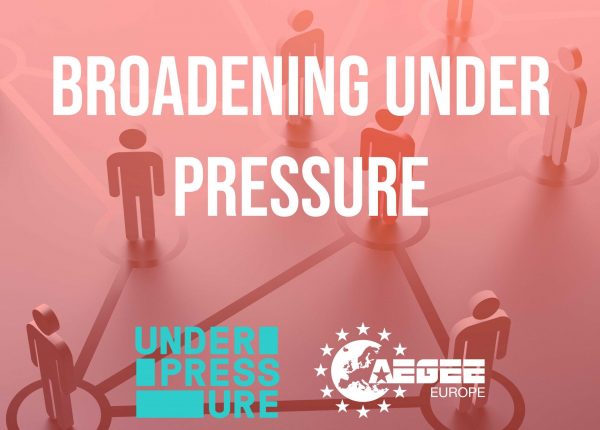

PEGAP partner AEGEE takes Under Pressure out of the classroom setting, and applies the same principles to tackle disinformation to their audience of young adults. Read more about their efforts to adapt the methodology in this blogpost.
The original Under Pressure methodology targets high school students and uses peer education in a classroom setting. These last months, PEGAP project partners led by AEGEE-Europe and AEGEE Academy trainers have set out to create an adapted version of the methodology targeting young adults, while also integrating non-formal education along with the peer education approach.
This adapted methodology, which is to be made available by the end of October 2020, could not be created without ensuring suitable content and a targeted approach. For this purpose, a target group research has been conducted through the following means:
1) A survey on young adults’ experiences with the media, news, fake news and disinformation;
2) A pilot session aiming to test and assess adapted training content and delivery in a non-formal education setting.
The survey, which was conducted through an online questionnaire in July 2020, gave some interesting results. Among these, it was noted that young adults are commonly aware that some media sources purposely spread fake news or disinformation, that young adults feel quite knowledgeable about ways to recognise fake news and disinformation, but less about the ways to deal with such news.
Maybe more surprisingly, it also appeared through the survey that a significant percentage of young adults believe that the news they come across on social media provide them with better insights than traditional media sources, and that encountering fake news or disinformation is more common when using the mainstream media than when using alternative media sources. These significant findings will be taken into account when adapting the methodology to ensure relevant discussions and reflection. The topics at stake can also be particularly addressed through the Under Pressure disinformation game and the UP editorial game, as these games put participants into the shoes of respectively alternative media websites and newspapers while highlighting commonly used disinformation techniques. From a broader perspective, it also appeared through the survey that young adults commonly feel that people treat others differently due to the media. A more detailed survey report can be found via this link.
A significant percentage of young adults believe that encountering fake news or disinformation is more common when using the mainstream media than when using alternative media sources.
During the pilot session, a handful of young adults learnt more about fake news and disinformation, took part in interactive discussions on their own experiences with such news, and tested an adapted version of the editorial game part of the Under Pressure methodology. In addition to supporting the creation of the adapted methodology, this pilot session was also a good opportunity for the participants to share their perspectives and to learn from each other in a non-formal education setting.
Some challenges brought up by participants related to the topic at stake included the difficulty to assess the reliability of information, the impossibility to be fully objective at all times, and young people’s lack of trust in the media, especially during times of crisis. In these regards, it was for instance pointed out that information on COVID-19 can vary greatly from one news source to another, and that it is often difficult to assess whether there is an intention to misinform. Some advice on how to deal with common challenges was also shared. It was recommended to keep in mind the differences between investigative newspapers and tabloids, to be aware of the impact that each of us can have when sharing news, to follow several media sources, as well as to check official sources such as data from the government and institutions, although one should keep in mind that data can be gathered and interpreted in different ways.
Following this target group research, a 3-day online training event was also organised by AEGEE-Europe with the support of Diversion and DROG. Stay tuned for more information on the outcomes of this training and for the release of the adapted methodology!
Author: Rivka Otten
